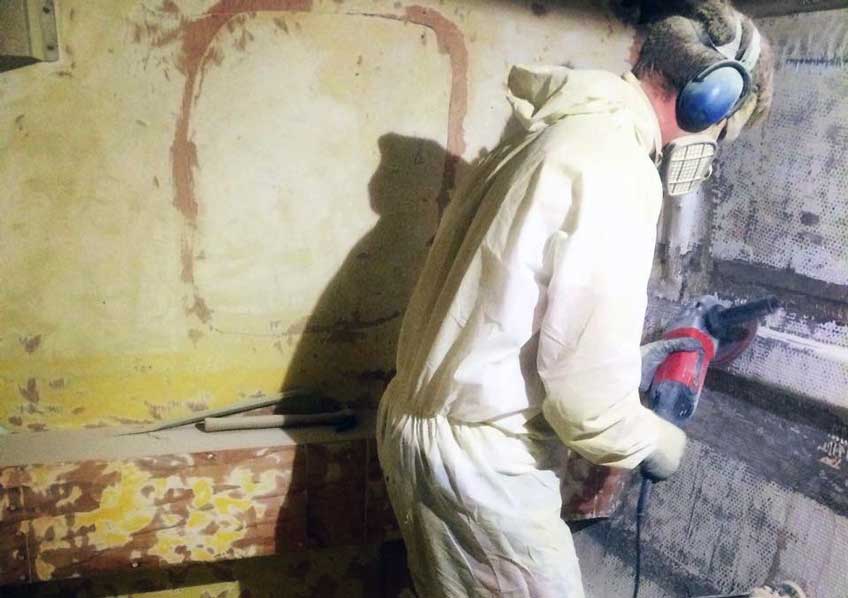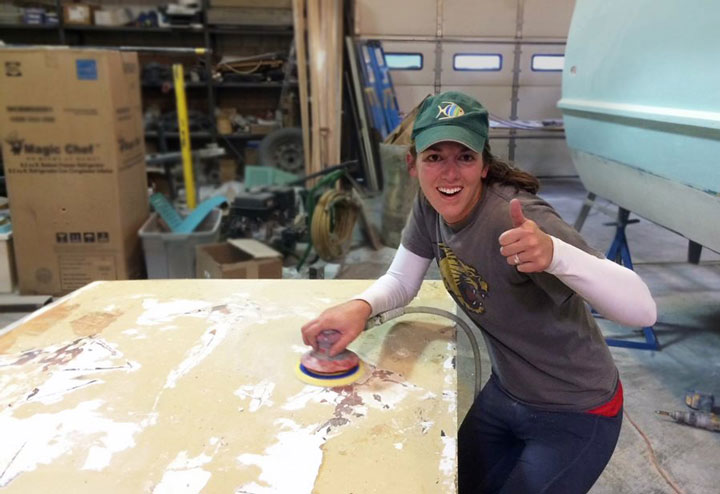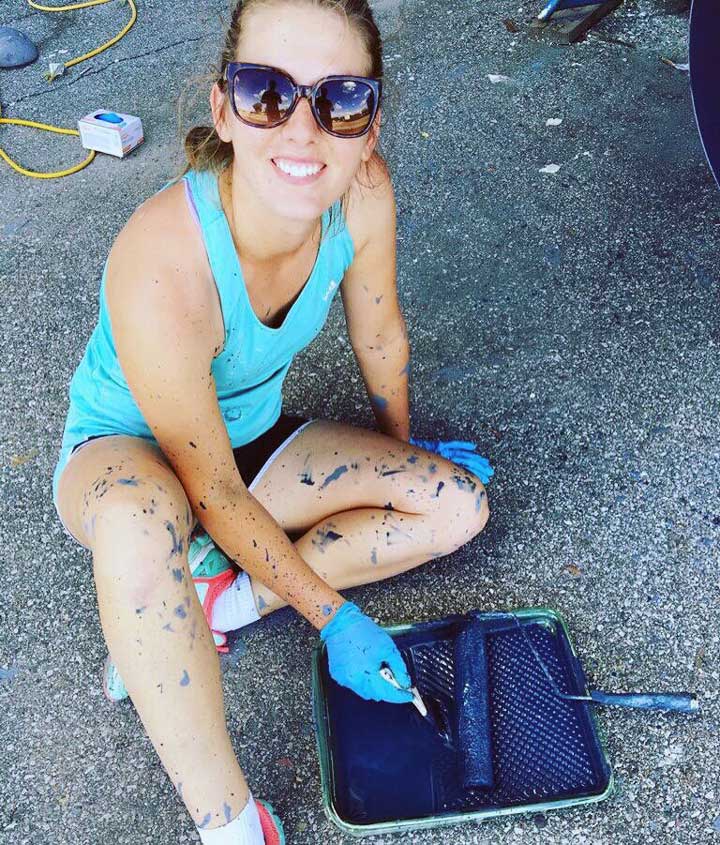Bethany Whitley is one of Quantum’s expert copywriters and has also spent her fair share of hours working on cruising boats in all sorts of conditions. Here she shares a fun approach to the topic of maintenance through the lens of the well-known book Zen and the Art of Motorcycle Maintenance.

“Technology presumes there’s just one right way to do things and there never is. And when you presume there’s just one right way to do things, of course the instructions begin and end exclusively with the rotisserie. But if you have to choose among an infinite number of ways to put it together then the relation of the machine to you, and the relation of the machine and you to the rest of the world, has to be considered, because the selection from among many choices, the art of the work is just as dependent upon your own mind and spirit as it is upon the material of the machine. That’s why you need the peace of mind.”
Zen and the Art of Motorcycle Maintenance, by Robert M. Pirsig
Ask five cruisers how to fix something and you’ll get six answers. You’ll commonly hear this idiom around boat yards and internet forums. Boat maintenance is a topic spoken of by sailors with the same enthusiasm as the weather. Conversations spin around and around with veracious, unavoidable, and mythic-like debate. Everyone has an opinion. So when I come across something that truly influences my approach to boat projects, I feel compelled to share it with my brethren.
Last year I read Robert Pirsig’s Zen and the Art of Motorcycle Maintenance. Many consider it to be the greatest American philosophy book of all time. While quite cumbersome to read, it contains nuggets of wisdom that transcend time and machines. The novel follows Pirsig’s narrator as he explores philosophical concepts: What is quality, Zen, value, and social acceptance? These concepts are made relatable to the reader through the concrete storyline that follows the narrator and his family as they travel across America by motorcycle, battling breakdowns, routine maintenance projects, bad weather, and internal conflict.
 Bethany Whitley smiles while sanding away.
Bethany Whitley smiles while sanding away.
I read the book while on a boat delivery and couldn’t help but think how relevant it was to the cruising and endless maintenance world I was living in. By the time I finished the novel, I felt like some people do after reading a particularly relevant Bible verse: inspired, clear-headed, and awakened. I even went as far as to write down key passages, tucking them away for times when I knew I might need some wisdom. Like the book, this article focuses more on the philosophy of boat repair than on the technical aspect of how to swap out a water filter or replace a spark plug. I hope these book passages (replace motorcycle with cruiser) will help you find your Zen while undertaking the most impossible of projects in less than ideal conditions.
THE MOST IMPORTANT TOOL
“If you’re going to repair a motorcycle, an adequate supply of gumption is the first and most important tool. If you haven’t got that you might as well gather up all the other tools and put them away, because they won’t do you any good.”
To begin with, the combination of tight engine rooms, damp bilges, and dangerous chemicals makes sailboat repairs a difficult process. Now add in the cruising factor and take away access to parts, proper tools, stores, English-speaking specialists, and an internet connection, and you have the makings of a cruiser’s nightmare. Having the fortitude to put your obstacles aside and press on with your repair, no matter how difficult the circumstances, requires more gumption than an average person is equipped with. That’s what sets cruisers apart: a shrewd or spirited initiative and the resourcefulness to get the job done.
Pirsig writes that “gumption is the psychic gasoline that keeps the whole thing going. If you haven’t got it there’s no way the motorcycle can possibly be fixed. But if you have got it and know how to keep it there’s absolutely no way in this whole world that motorcycle can keep from getting fixed. It’s bound to happen. Therefore the thing that must be monitored at all times and preserved before anything else is the gumption.” So before you pick up that crescent wrench ask yourself one simple question: Got gumption?
EXPAND RATIONALITY
“The solution to the problem isn’t that you abandon rationality but that you expand the nature of rationality so that it’s capable of coming up with a solution.”
Our world has been drastically changed by brave souls who, through their own determination, thought outside of what was rationally accepted and expanded the world of understanding for all of us. People like Aristotle who rejected the notion of a flat world, Charles Darwin who gave us the theory of evolution, and Sir Isaac Newton who theorized gravity.
These brilliant thinkers all knew that rational thinking wasn’t the enemy, but rather it was the notion that one must think within the confines of what others generally assumed to be a fact. They understood that assuming was in fact the most irrational way to think!
 There's a lesson for life and cruising in there somewhere. Bethany Whitley works on painting their boat.
There's a lesson for life and cruising in there somewhere. Bethany Whitley works on painting their boat.
So what does this have to do with fixing my boat? Aside from gumption, the ability to adapt and think outside the box is a skill that the most successful long-term cruisers have honed. While a manual may give direction, a true cruising warrior knows that there are infinite ways to adapt the tools, materials, and available time. They also know that if you don’t adapt, you often end up with an inferior, expensive, and more time-consuming result. The best maintenance gurus read the manual twice, assess their personal situation, and then come up with the solution that best fits their needs and the needs of their vessel. They reject rigidity and embrace creativity.
Here’s an example. My husband and I experienced a failure with our electric dinghy lift this year. The gear box sprocket sheared off the lifting cable spool, resulting in an inoperable lift. After contacting the UK manufacturer, it became apparent that no parts were readily available. Further, it would take $2,000 and four weeks before we could get a replacement gear box. We sat down and muddled over our options: cancel our travel plans for the next month or start experimenting with alternative solutions. After a few beers, many phone calls, and several frustrating dead ends, we decided the best and most rational step forward was to weld the shaft back onto the sprocket as a temporary fix. Disassembling and reassembling the gear box was easier said than done, but, after mustering all our gumption, we completed the job and realized this was no temporary fix. This fix seemed to be just as good if not better than replacing the whole thing. We have not had the gear box act up since. Not only were we able to save our travel plans, but we also saved several thousand dollars and felt good about coming up with a solution on our own.
FIND YOUR ZEN
“His motions and the machine are in a kind of harmony…the nature of the material at hand determines his thoughts and motions, which simultaneously change the nature of the material at hand. The material and thoughts are changing together in a progression of changes until his mind is at rest at the same time the materials right.”
The art of the work, finding flow, and achieving Zen. Zen is the basic concept of knowing your machine so intimately that you achieve a harmony (even through repairs) working with it over time. Love, determination, confidence, and respect are all in balance.
Once you have accepted your vessel for what she is–the good, the bad, and the ugly–and have come to recognize your relationship with her is one of mutual benefit, you will realize that projects are part of your love story. You will break things on her and she will sometimes break down on you, but, if you can find the art of working with her, she will take you places and you’ll share experiences you never dreamed of.
The boat my husband and I are currently on has more projects than just about any we have had. In the last two weeks, we had plumbing issues, winch issues, rigging problems, and fresh water contamination. But I write this while sitting on the stern of said boat, drinking tea and looking out at the hills of Tortola. Last night was particularly windy. When I got up to check our holding, I was dazzled by thousands and thousands of phosphorescent squid circling our vessel. Their small glowing bodies at different water levels and in various clusters resembled the faraway pictures I’ve seen of our galaxy. At that moment I was glad to have shown the boat some love and sweat during the week because she showed me in that moment what being a cruiser is all about.
 It's all worth it.
It's all worth it.
So keep your best tool handy, expand your thinking, and find the art in your work, and the projects you encounter will start to seem laughably insignificant compared to the places you go and the things you experience while enjoying a cruising lifestyle. If you need a reminder, simply pick up Pirsig’s novel and dig in.
-----
Citation: Pirsig, Robert M. Zen and the Art of Motorcycle Maintenance: An Enquiry into Values. HarperTorch; 1st edition 2006